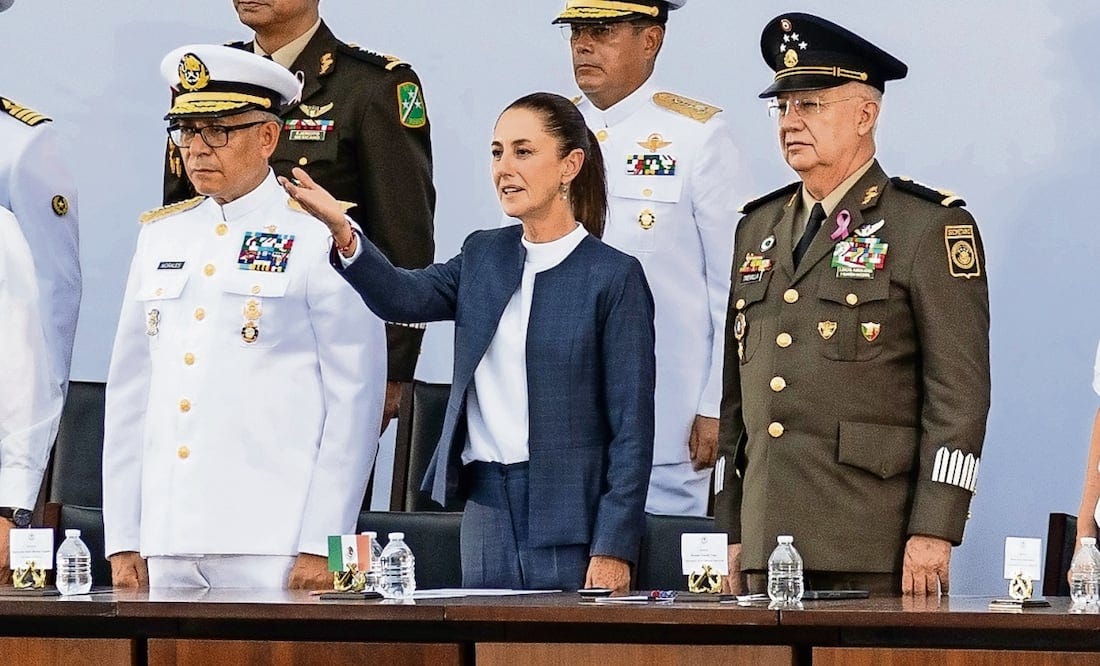Claudia Sheinbaum's Presidency: Summary and Analysis of Day 7
National Security Strategy presented, chilling updates on murdered politician, comments on upcoming US election...This is day 7 of Sheinbaum's presidency.
President Sheinbaum reached the one-week mark of her presidency. Today’s mañanera began with updates regarding Hurricanes Milton and John. At one point, Milton was just 60 kilometers away from Progreso but did not make landfall, instead causing flooding in some coastal areas of the region. As of today, there have been zero reported deaths. Clean-up efforts in Acapulco in the wake of Hurricane John are underway.
As mentioned last week, Sheinbaum reiterated that her administration will not return to the war on drugs strategy (as initiated by former President Calderón) to fight this current wave of violence. Instead, a comprehensive approach to security will be taken with all states and the federal government playing an active role. She stated that a key element to the national security strategy will be addressing the financial arm of organized crime and as such will develop an additional cabinet comprised of members of the country’s Financial Intelligence Unit (UIF), Attorney General’s Office, Pemex, and Tax Administration (SAT). President Sheinbaum explained that a central component of her administration’s national security strategy will center on neutralizing generators of violence and combatting drug (specifically fentanyl) and arms trafficking by criminal networks. Part of this strategy includes the implementation of a reward program for the arrest of individuals known to generate significant violence within the country. Also a priority is reducing high-impact crimes, particularly in the 10 municipalities that account for 25.3% of all homicides in Mexico.1 Ten task forces will be developed to address violence and insecurity on various topics including: improving highway safety through cooperation of Sedena and Semar and the use of advanced technology, addressing lime extortion in Michoacán, and the use of an operational strategy to address homicides in Chiapas (which are concentrated in 12 municipalities of the state). The national security strategy will center on four key elements:
Address the root causes of violence. This administration will continue the approach of the AMLO administration in helping the country’s most vulnerable families, reducing poverty, closing inequality gaps, and generating opportunities - all with the goal of reducing violence in the country.
Consolidate the National Guard. In the words of García Harfuch, strengthening the operational capacities of the National Guard “…will guarantee their permanence, discipline, development, and professionalism.” The National Guard consists of 133,000 members who can be deployed to areas that have insufficient police forces.
Strengthen the country’s intelligence and investigative capacities through the use of more advanced technical and technological data to analyze data and prevent violence.
Foster an environment of coordination for security cooperation, including the establishment of goals and evaluation standards for state-level police forces, prosecutors’ offices, and penitentiary systems across Mexico.
Omar García Harfuch, the head of Secretary of Security and Civilian Protection, also laid out three objectives to ensure lasting peace in the country:
Decreasing incidences of crime
Neutralize both generators of violence and criminal networks
Strengthen the capabilities of local police, specifically for crime prevention.
He mentioned that his security cabinet will visit Culiacán to supervise security-related tasks and also reiterated collaboration with the federal government and Sinaloa governor. On a different, but security-related note, García Harfuch confirmed that Alejandro Arcos, the mayor of Chilpancingo who was found brutally murdered on Sunday, did not request security protection. He had traveled for a meeting to Petaquillas, a small, rural town in territory controlled by the criminal group, Los Ardillos. It remains unclear who Arcos was meeting and who was responsible for his death. President Sheinbaum specifically said that there will not be impunity in this case nor in the case of the six migrants killed by the Mexican military. It was also mentioned that various political figures have requested security protection in the wake of recent violence across the country, such as mayors from Oaxaca and Guerrero.
The current governor of Puebla (whose term is set to expire in December), Sergio Salomón Céspedes Peregrina will serve as the new director of Mexico’s National Migration Institute (INM), to replace the current director appointed by AMLO. Of note, Céspedes has an extensive career as a politician, joining the PRI in 1986 and serving in the local congress. He then joined Movimiento Ciudadano in 2018 before switching to Morena in 2021. His experience in terms of migration and migration policy appear to be minimal.
President Sheinbaum announced preliminary plans intended to improve the quality of life of residents of the eastern part of Estado de Mexico, a region that’s home to more than 10 million inhabitants. The proposal includes improvements to drainage, water access, roads, and more. The budget and further details are to be announced, but the project is slated to begin in 2025.
The president also remarked on the upcoming US election stating that her administration will work with whichever candidate that wins and will refuse to take sides in the days leading up to the election, stating that the Mexican Constitution does not permit preferences in foreign elections.
According to the Executive Secretariat of the National Public Security System (SESNSP), the following ten municipalities account for 25.3% of all violence in Mexico: Colima, Colima; Tijuana, Baja California; Acapulco, Guerrero; Celaya, Guanajuato; Cajeme, Sonora; Ciudad Juárez, Chihuahua; Tlajomulco de Zúñiga, Jalisco; Chihuahua, Chihuahua; León, Guanajuato; Benito Juárez, Quintana Roo.






It's very encouraging to see the progress being made in public safety. It would be nice, however, if the president addressed the historic refusal on the part of law enforcement and judges to investigate, arrest, prosecute and sentence criminals to prison.